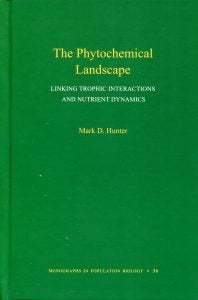 After three years of writing, Mark’s new book appeared in late August. It’s called “The Phytochemical Landscape: Linking Trophic Interactions and Nutrient Dynamics,” and is published by Princeton University Press as one of their Monographs in Population Biology. The book explores how spatial and temporal variation in the chemistry of primary producers organizes the interactions that flow between consumers and ecosystem nutrient dynamics. You can find out more about the book here or here, and you can always buy your own copy at Amazon!
After three years of writing, Mark’s new book appeared in late August. It’s called “The Phytochemical Landscape: Linking Trophic Interactions and Nutrient Dynamics,” and is published by Princeton University Press as one of their Monographs in Population Biology. The book explores how spatial and temporal variation in the chemistry of primary producers organizes the interactions that flow between consumers and ecosystem nutrient dynamics. You can find out more about the book here or here, and you can always buy your own copy at Amazon!
Callie Chappell Gains Triple the Honors
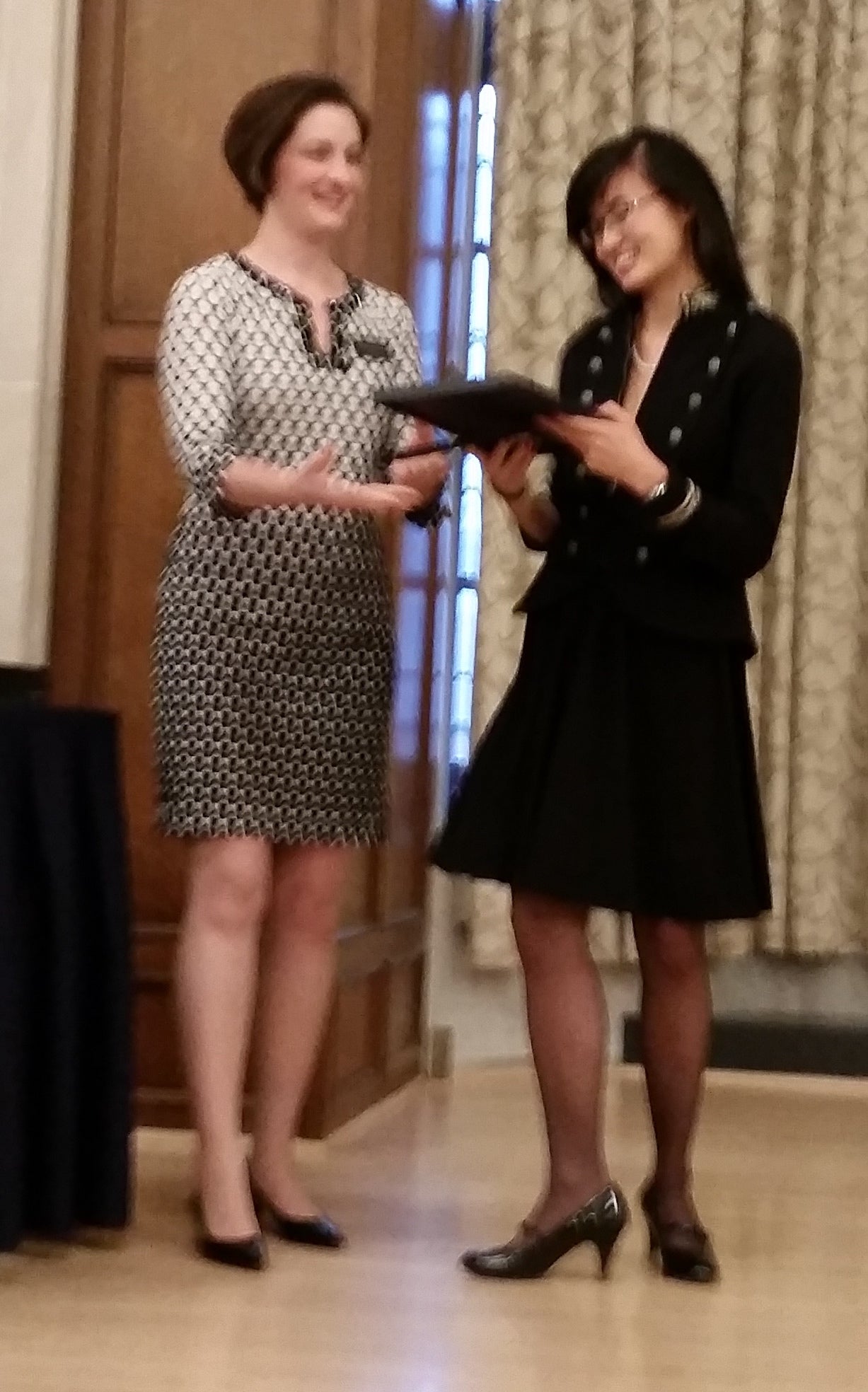 Callie received two highly prestigious awards and the opportunity to address her peers as she completed her undergraduate degree here at UM. She received the Christine Psujek Memorial Undergraduate Award for the best Honors thesis across all of the UM Biology Majors. Moreover, Callie was awarded the Marshall Nirenberg Award, the Goldstein Prize that is awarded to the top Honors student graduating in the Life Sciences at UM. Finally, Callie was chosen as one of the undergraduate speakers at the Honors Commencement Ceremony. Receiving all of these awards is truly remarkable. Many congratulations, Callie!
Callie received two highly prestigious awards and the opportunity to address her peers as she completed her undergraduate degree here at UM. She received the Christine Psujek Memorial Undergraduate Award for the best Honors thesis across all of the UM Biology Majors. Moreover, Callie was awarded the Marshall Nirenberg Award, the Goldstein Prize that is awarded to the top Honors student graduating in the Life Sciences at UM. Finally, Callie was chosen as one of the undergraduate speakers at the Honors Commencement Ceremony. Receiving all of these awards is truly remarkable. Many congratulations, Callie!
Johanna Nifosi Gains Master’s Degree
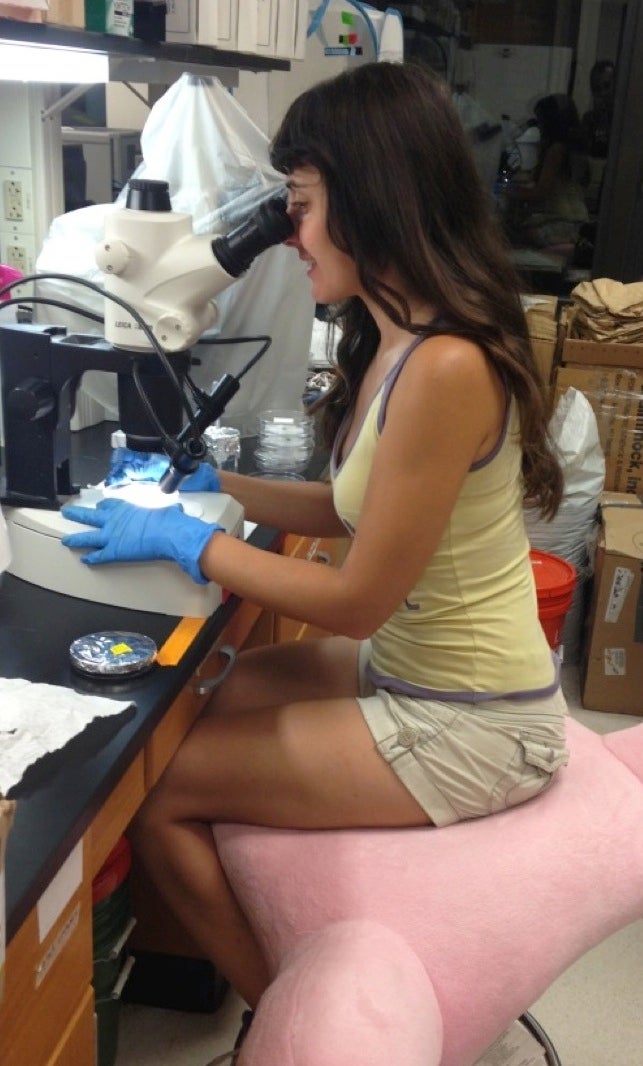 Congratulations to Johanna Nifosi, who successfully defended her Master’s Thesis in Ecology & Evolutionary Biology on April 20th. Johanna studied the effects of rising temperatures on the interactions between monarch butterflies and their parasites. Her work has shown that, when monarchs are co-infected with multiple parasites, the virulence of the protozoan parasite, OE, increases with temperature. In general, monarchs perform very well at higher temperatures, around 28 degrees centigrade. But, when co-infected with parasites, monarchs lose all of the gains that they receive from life in a warmer world. Overall, Johanna’s work suggests that, as global warming continues, any potential benefits that monarchs might gain could be eradicated by greater parasite virulence.
Congratulations to Johanna Nifosi, who successfully defended her Master’s Thesis in Ecology & Evolutionary Biology on April 20th. Johanna studied the effects of rising temperatures on the interactions between monarch butterflies and their parasites. Her work has shown that, when monarchs are co-infected with multiple parasites, the virulence of the protozoan parasite, OE, increases with temperature. In general, monarchs perform very well at higher temperatures, around 28 degrees centigrade. But, when co-infected with parasites, monarchs lose all of the gains that they receive from life in a warmer world. Overall, Johanna’s work suggests that, as global warming continues, any potential benefits that monarchs might gain could be eradicated by greater parasite virulence.
Undergraduates Shine in Research
Many congratulations to Fauna, Harrison, Abrianna, and Callie, who presented their research during posters sessions this week. Fauna and Harrison’s work in the UROP program has helped us to understand how mycorrhizal fungi influence the phenotype of milkweed plants. Abrianna has shown how food quality and infection with disease influence monarch wing shape. Callie’s Honors Thesis describes how the chemistry of milkweed plants under environmental change influences the population dynamics of aphids. We’re so proud of you all.
Upcoming Science Cafe
Come visit with Leslie Decker and Mark Hunter in an upcoming Science Cafe in downtown Ann Arbor. We’ll be talking about monarch butterflies, environmental change, and medication behavior.
Monarchs and Elevated CO2: What will the Future Bring?
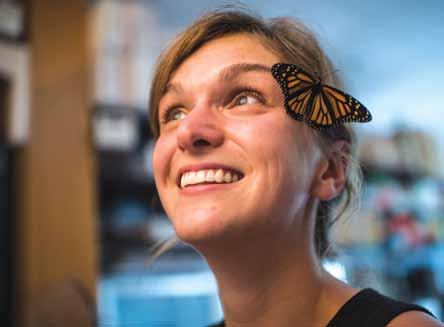 Leslie Decker in our lab is focusing on potential effects of elevated concentrations of atmospheric CO2 on monarch butterflies and their parasites. As the concentration of CO2 in the atmosphere goes up, concentrations of medicinal cardenolides in milkweed leaves decline. As a result, monarch butterflies may become more susceptible to their parasites. You can read the article and watch a video of Leslie’s research.
Leslie Decker in our lab is focusing on potential effects of elevated concentrations of atmospheric CO2 on monarch butterflies and their parasites. As the concentration of CO2 in the atmosphere goes up, concentrations of medicinal cardenolides in milkweed leaves decline. As a result, monarch butterflies may become more susceptible to their parasites. You can read the article and watch a video of Leslie’s research.
Interactions Across 4 Biological Kingdoms Gets at the Root of Disease Ecology
We’ve been in the news recently, after the publication of a paper in Proceedings of the Royal Society Series B. The paper is a collaboration between our lab and that of Jaap de Roode at Emory. The first author is Leiling Tao, a post-doc with Jaap and a former grad student in our lab.
The new paper illustrates how interactions among four Biological Kingdoms influence dynamics of disease between monarch butterflies and their protozoan parasite. The identity and abundance of mycorrhizal fungi (Kingdom 1) influence the cardenolide and phosphorus chemistry of milkweed plants (Kingdom 2). In turn, milkweed chemistry determines how monarch butterflies (Kingdom 3) resist and tolerate their protozoan parasite (Kingdom 4).
Because around 90% of terrestrial plants host mycorrhizal fungi, the new work has implications for disease dynamics across diverse terrestrial systems. It now seems that the medicinal properties of plants can’t be studied without reference to their symbiotic mycorrhizal fungi.
You can read the original press release here, and the associated news story in Science here.
Masterful Holly Andrews
 Many congratulations to Holly Andrews who successfully defended her Master’s thesis at the end of April. Holly’s thesis is entitled, “Changes in water availability and variability affect plant defenses and herbivore responses in grassland forbs” and considers how milkweed plants might respond to predicted changes in precipitation regimes. Holly found effects of water availability and variability both on plant growth and plant defense against herbivores. Her results suggest that milkweed species and genotypes have the potential for both adaptation and migration under climate change, but that herbivores will influence the outcome of such plant responses.
Many congratulations to Holly Andrews who successfully defended her Master’s thesis at the end of April. Holly’s thesis is entitled, “Changes in water availability and variability affect plant defenses and herbivore responses in grassland forbs” and considers how milkweed plants might respond to predicted changes in precipitation regimes. Holly found effects of water availability and variability both on plant growth and plant defense against herbivores. Her results suggest that milkweed species and genotypes have the potential for both adaptation and migration under climate change, but that herbivores will influence the outcome of such plant responses.
Holly will spend part of the summer with us in Michigan heading west. She will be attending the University of California – Riverside to complete her doctorate in Evolution, Ecology, and Organismal Biology with Dr. Darrel Jenerette. Holly will continue to look at plant and ecosystem ecology in the face of global environmental change.
Congratulations Holly – we’re proud of you!
We’d like to thank the Academy…
It’s awards season , and our lab members have received some very prestigious grants and fellowships to support their research. Amanda Meier received a Graduate Research Fellowship from the National Science Foundation, joining Katherine Crocker as a recipient of one of these highly competitive five-year awards. Amanda also received a Winnifred Chase Fellowship from the Matthaei Botanical Gardens and an Emma J. Cole Fellowship from EEB to help support her upcoming field research. Many congratulations, Amanda!
, and our lab members have received some very prestigious grants and fellowships to support their research. Amanda Meier received a Graduate Research Fellowship from the National Science Foundation, joining Katherine Crocker as a recipient of one of these highly competitive five-year awards. Amanda also received a Winnifred Chase Fellowship from the Matthaei Botanical Gardens and an Emma J. Cole Fellowship from EEB to help support her upcoming field research. Many congratulations, Amanda!
I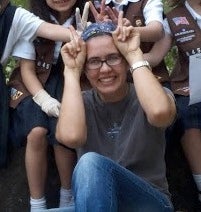 n addition to holding a GRF from the NSF, Katherine Crocker recently received the Susan Lipschutz Award from the Rackham Graduate School, an E.S. George Reserve Scholarship Award, and a Theodore J. Cohn Research Award from the Orthopterists’ Society. These awards will allow Katherine to expand her research on the mechanisms by which parental environment influences offspring life history traits. Katherine’s plans include a new field study of environmental influences on hormone provisioning in the eggs of native crickets. Way to go Katherine!
n addition to holding a GRF from the NSF, Katherine Crocker recently received the Susan Lipschutz Award from the Rackham Graduate School, an E.S. George Reserve Scholarship Award, and a Theodore J. Cohn Research Award from the Orthopterists’ Society. These awards will allow Katherine to expand her research on the mechanisms by which parental environment influences offspring life history traits. Katherine’s plans include a new field study of environmental influences on hormone provisioning in the eggs of native crickets. Way to go Katherine!
 Leslie Decker has received support from the Marian P. and David M. Gates Graduate Student Fund at the University of Michigan Biological Station. Coupled with Barr-Bigelow Research Funds from EEB, Leslie’s funding will allow her to continue exploring the effects of environmental change on parasite-host interactions in monarch butterflies. We are very grateful to the Gates family for their generous support – David Gates was Director of UMBS from 1971 to 1986. Thanks Prof Gates and well done, Leslie!
Leslie Decker has received support from the Marian P. and David M. Gates Graduate Student Fund at the University of Michigan Biological Station. Coupled with Barr-Bigelow Research Funds from EEB, Leslie’s funding will allow her to continue exploring the effects of environmental change on parasite-host interactions in monarch butterflies. We are very grateful to the Gates family for their generous support – David Gates was Director of UMBS from 1971 to 1986. Thanks Prof Gates and well done, Leslie!
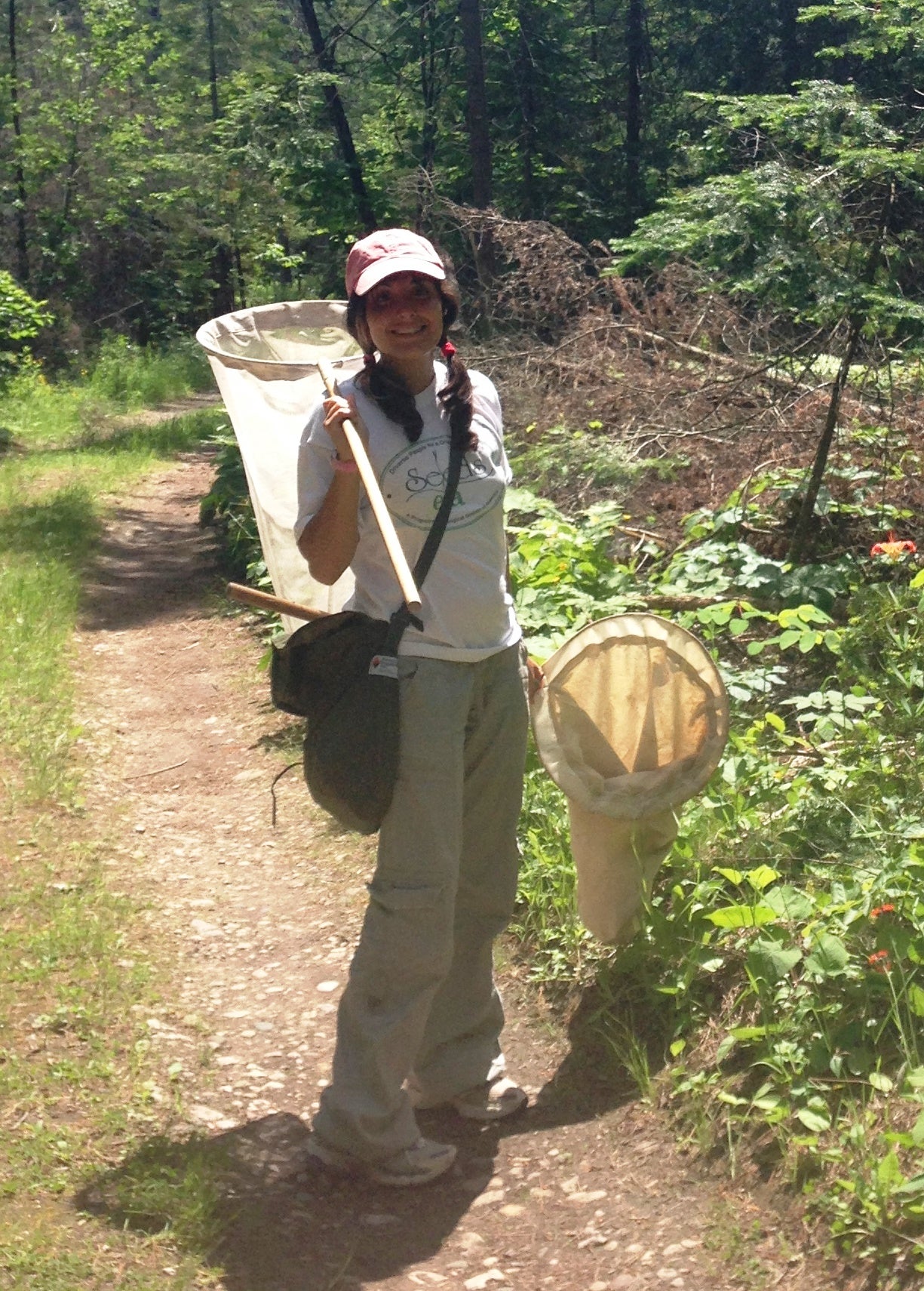 Johanna Nifosi has been awarded Peter Olaus Okkelberg funds to begin a research project on the effects of increasing global temperature on parasite-host interactions. Johanna will explore how projected increases in temperature during the breeding season of monarch butterflies may influence the virulence and transmission potential of their protozoan parasite. Congratulations Johanna!
Johanna Nifosi has been awarded Peter Olaus Okkelberg funds to begin a research project on the effects of increasing global temperature on parasite-host interactions. Johanna will explore how projected increases in temperature during the breeding season of monarch butterflies may influence the virulence and transmission potential of their protozoan parasite. Congratulations Johanna!
As a group, we are very grateful for continued research support and thank the organizations and individuals who make our work possible. We’re looking forward to another exciting and productive research season.
Holly Andrews engages in science policy in D.C.

Last October, Holly represented the University of Michigan Biological Station on Capitol Hill at the annual conference of the Association of Ecosystem Research Centers. You can read all about Holly’s engagement with science policy by following this link.



